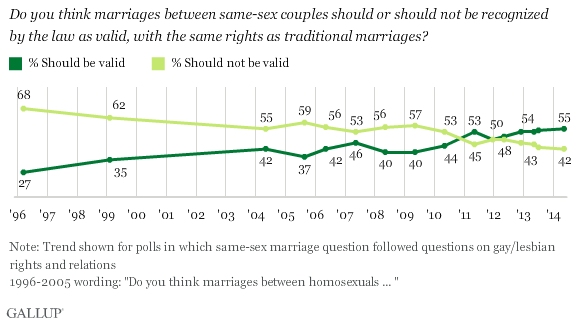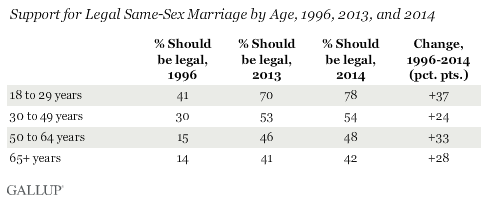Unclear on the Concept: Cruz and SCOTUS
“This is judicial activism at its worst”-Senator Ted Cruz (R-TX) on SCOTUS, um, inaction on same-sex marriage.
Also, good luck with this:
I have introduced legislation, S. 2024, to protect the authority of state legislatures to define marriage. And that is why, when Congress returns to session, I will be introducing a constitutional amendment to prevent the federal government or the courts from attacking or striking down state marriage laws.
And speaking of unclear on the concept:
It is beyond dispute that when the 14th Amendment was adopted 146 years ago, as a necessary post-Civil War era reform, it was not imagined to also mandate same-sex marriage, but that is what the Supreme Court is implying today. The Court is making the preposterous assumption that the People of the United States somehow silently redefined marriage in 1868 when they ratified the 14th Amendment.
Yes, but that really isn’t the relevant test as the language rather clearly notes that all citizens deserve equal protection of the laws and that states cannot deny citizens “the privileges or immunities of citizens of the United States.”
Further, as big a proponent as I am for majority sentiment driving basic national policy, basic human rights are not subject to majority vote. Of course, beyond that, Cruz is well behind the national curve:

Not to mention, the generational shift that is already underway:

Source: Same-Sex Marriage Support Reaches New High at 55%






Cruz doesn’t think any of his nonsense will actually pass. This is all about positioning himself as the “Real Conservative” during the upcoming Presidential campaign.
@Mikey: Of course.
Unusually, Steven, I actually think you lost the plot here a little on what could have been a more succinct post. Everything starting with “Furthermore, as big a proponent …” may be correct, but it’s not really about Cruz’s complete misunderstanding of the judicial branch. His ridiculous interpretation of the law borders on astounding, even for a politician.
@Mikey:
And that may backfire. At least a third of Republicans and possibly a majority of young Republicans, support same-sex marriage. Even for the conservative core, this isn’t a pressing issue anymore. The general feeling among conservatives I speak to is to shrug and say there are more important issues. That’s less than a decade removed from when this was the Great Moral Challenge of Our Time. Very shortly, Cruz is going to be in the minority in his own party. And if he tries to run on it, he will get hammered.
The Republicans who are serious about the future of the party are “evolving” on the issue just as the Democrats did. They can see the writing on the wall and know that their opposition will be remembered for a long time.
Cruz’s acolytes don’t actually care if he does anything concrete. It’s the bloviation and grandstanding that appeal to them.
@Franklin: No, you are correct: it is about pandering more than anything else. Although, I personally know enough people who agree with what Cruz said that I feel it is fair game to take him at his word (or, at least, to treat directly with those words).
The context for that first sentence:
@Pinky: Ultimately he is doing what most people do: defining “judicial activism” as the courts doing something that he doesn’t like.
@Steven L. Taylor: That’s not true. He’s defining it as the judiciary overruling laws on the basis of philosophy rather than legality.
For all Cruz’ reputation as being brilliant, I just don’t see it. In the two years he has been Senator here in TX, he has accomplished zero and has just demonstrated a facility for publicity and demogoguery. All hat and no cattle.
@Pinky:
But the context doesn’t help at all. He’s still unclear on the role courts play in our government, and the definition of judicial activism.
Nope, that’s their role and duty when the law is unconstitutional.
It would be like saying “Can you believe that Congress has let so many state legislatures pass their own laws without they themselves passing the exact same laws to confirm they are legal?”
The underlying complaint seems to be that the Supreme Court should step in and overrule the Appeals Courts. Of course, they could affirmatively confirm the rulings which would elicit the same claims of judicial activism. The most likely scenario for a Supreme Court is the one where they have to adjudicated conflicting rulings between Appeals Court. This scenario has not yet happened.
@Neil Hudelson: Agree or disagree, he’s not unclear. He goes on in the statement to explain why he believes that the 14th Amendment doesn’t apply.
I think that’s what gets me about Steven’s write-up. There’s a smugness to it, that, um, the former Solicitor General of Texas who has argued before the Supreme Court is less clear on jurisprudence than Steven is. Like I said, disagreeing with Cruz is one thing, but don’t pretend that you’re straining yourself trying to adjust your intellect downward to even understand his words. (Note: that “don’t pretend” wasn’t directed against you.)
@Pinky:
For someone concerned with the exact meaning of words and context, I’m wondering where you get the idea that he’s defining judicial activism as rulings based on philosophy rather than legality. Throughout his screed, his biggest (and only) complaint is that the interpretation of the 14th amendment (a subsection of the highest law of the land) is too broad.
Which would mean…that it’s his “philosophy” about courts that is the issue here. Not the court’s philosophy.
@Pinky:
I would say that Solicitor Cruz would probably have never used the definition of “judicial activism” that Senator Cruz just used.
@Pinky:
It is probably smug to say so, but I have zero problem with that characterization.
(And yes, the initial line of my post was consciously snarky–the rest, not so much).
@Pinky:
I will say this: I am not stating that I have to adjust my intellect downward to understand Cruz. As stated above, I think this is primarily pandering.
I do find the charges of “judicial activism” to be silly–at least if directed at SCOTUS. Even in terms of the lower courts I think it is a problematic assertion. But I find these simplistic originalist positions intellectually problematic to begin with–especially when used in a political pander.
(Also: if it was so obvious that the lower court rulings were out of sync with the constitution, why didn’t 4 of the conservative Justices want to hear the case so as to correct the error? Hmm, I am talking myself back into smugness…. 😉
@Neil Hudelson: It’s the commonly-understood definition of the term on the right, plus or minus my clumsy phrasing. What Cruz said makes sense with that definition. I’d need to see evidence that Cruz has implied any other meaning than that.
@Pinky: I just Googled “define: judicial activism” and this is what I got:
@Pinky: Indeed–that is a typical definition. The problem becomes the application, especially when used in a political context.
Given the common law nature of out system, all judicial considerations require some degree of interpretation. What does it mean, for example, that all citizens should be treated equally under the law? Does one apply a plain meaning of the words? Does one seek out precedents? Does one look to the original intent of the author? Every choice made entails some degree of “personal or political consideration” so what, ultimately, does “judicial activism” really mean?
Let me reiterate a point I made in a comment to Pinky above: it only takes 4 Justices to accept a case. That the originalists (Thomas and Scalia) plus Roberts and Alito did not feel as strongly as Cruz allegedly does about this matter and its constitutionality undercuts the notion that Cruz has a solid argument to make here.
@Steven L. Taylor: If that’s a typical definition, then your comment that Cruz is “defining “judicial activism” as the courts doing something that he doesn’t like” was in bad faith.
@Pinky: Did you read the rest of my response? It rather demonstrates the ultimate problem with the definition.
(As long as any attempt to engage in judicial interpretation is going to rely on some degree of “personal or political considerations” then calling something “judicial activism” is worthless and tends, as I noted above, to mean ” the courts doing something that he doesn’t like.”)
Tell me the constitutional provision dealing with rights that can be applied without some level of interpretation.
@Steven L. Taylor:
See, that’s a topic for a mature conversation, which is different from taking, um, potshots.
@Pinky:
When Ted Cruz starts engaging in mature conversation, he won’t get potshots.
@Pinky: Thanks, I guess. But that does not answer my question, nor does it address my overarching point.
@Steven L. Taylor: I went looking for a good discussion of this issue. I found this by Thomas Sowell. I’m about halfway through it. It’s a workout. But it seems to be a good starting point for a serious discussion.
@Pinky: Gee, can the states define race as well? Does Cruz believe that Louisiana would have the right to rule a “one drop of black blood means you’re black” rule?
@Pinky: And it’s exactly what Justice Scalia does with his “originalist constructionism”. We’re talking about someone who thinks that the 14th Amendment doesn’t cover equal rights for women, by the way.
@Pinky:
So the invoking equal protection is based on philosophy rather than legality? Really?
@Pinky: Well, I would suggest that a place to start might be in my response to the definition you cited and the subsequent conversation that emerged, or even Senator Cruz’s approach to the 14th Amendment, since those issue have been raised. I am not sure that a reading assignment is necessary at the moment.
@Steven L. Taylor: I’m not sure that Thomas Sowell counts as a “reading assignment.” More like punishment.
@wr: When he’s partisan, he’s partisan. When he’s intellectual, he’s intellectual.
@Pinky:
The constant “um..” pauses are annoying in speech but understandable. It’s a stalling tactic to provide a little time to determine what the speaker wants to say.
In writing it’s just silly. It conveys nothing except the sarcasm of the writer.
Don’t be passive aggressive Pinky.
weird, i was listening to npr and there were quite a few peeps upset that they punted the issue.
@Davebo: You do realize I was mocking that very immaturity in the first line of this piece, right?
@Davebo: @Pinky: In fairness, I was the first to deploy an “um” (and I have copped to the snarkyness of that deployment).
(Granted, I didn’t keep using while at the same time trying to criticize someone else for being insufficiently serious…).
@Davebo: Davebo, I don’t know if you’re on the left or the right, but if you are on the left, this was a perfect illustration of the tendency to spot annoyances on the other side and overlook them on one’s own. I mean, really, it was the first line of the article. You wouldn’t have to have read it in-depth to notice it. I used “um” twice, once referring to Steven’s potshots, once to his smugness. The context was clearly a reference to his use of the word. Even the way you referred to it as “constant” – I don’t know if I’ve used it before, but I only used it twice here. It’s just bizarre that you’d call me out for it.
@Steven L. Taylor:
Yeah, you did. That was the whole point of the article.
@Pinky:
I used “um” once: in the first line of the post.
(and BTW: you never have actually addressed the problems with the definition of judicial activism that I offered nor have you explained how you think activism and restraint function).
@Steven L. Taylor:
See the Sowell article.
@Pinky: That’s not a response. That is outsourcing your argument to someone else. Am I then to assume that you agree with every single word in that paper? Does it represent your whole knowledge and opinion on the subject? Since I am pretty sure you googled and found it after this discussion started, I don’t see how it could be representative of your views.
You want to call me out for being overly snarky in my post, that’s fair. However, it is intellectually lazy to come into the conversation accuse me of potshots and smugness and then, when I engage on substance for you not address one substantive point I have made and then try to farm out a response to something you googled.
@Steven L. Taylor: A few years back, I read a book entitled “A Matter of Interpretation”. It’s an essay by Scalia, with responses from Dworkin, Tribe, and others, then responses from Scalia. I wouldn’t know how to summarize it in a few paragraphs. The question you’re asking is very, very basic – which is not to say it’s stupid, or necessarily easily-answered. I think if you read Scalia’s book you’d have satisfactory answers. But that’a a tough request for a message board, so I thought I’d at least give a recommendation of an article for you or anyone reading who might be interested in the subject.
We play a game on message boards, acting as if any position can be explained and/or refuted in two paragraphs. I haven’t studied much law, but I don’t think it’s realistic to expect potato-chip-sized answers. So I recommended a website that I thought would give a good understanding of the issue. If you don’t want to read it, that’s on your laziness, not mine.
@Pinky: if you don’t want to actually discuss the issues, that’s fine. However, it rather undercuts you initial critique, yes?
I am not asking for solutions in two paragraphs. I am noting that it is possible to have a discussion in this context.
At this point I must question why you even bothered to comment in the first place.
@Pinky: When he’s
partisannot agreeing with me, he’s partisan. When he isintellectual, he’s intellectual.FIFY
@Just ‘Nutha’ Ig’rant Cracker: Personally, I wish he’d never written a column in his life. He’s a very interesting economic researcher. Anyone could write his political/social columns, but his economics is unique. His first book, a repackaging of his doctoral thesis, was on Say’s Law. His second (I might have the order backwards) was on Marxism. He’s done considerable research on minority groups and international economics. I don’t always agree with his intellectual work, but it’s high-quality.
Also, I’ve never been a fan of “FIFY” stuff, but that one doesn’t even make sense.